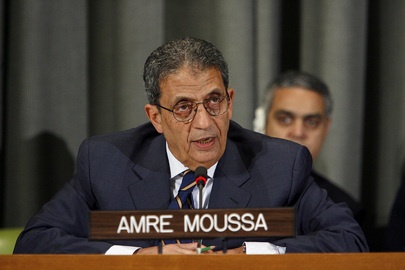
Ahead or Behind the Moment? Nudged by Obama Administration, Mubarak pledged to step aside as part of next elections. Senator John Kerry telegraphed the change in Obama Administration policy – Mubarak is no longer seen as an asset but a liability for official Washington.
Changing Horses?
Reversing vague statements by Administration leaders the past week whether President Hosni Mubarak should be a candidate for re-election, it appears that President Barak Obama has informed the current Egyptian leader that he should commit himself to step aside, interestingly on almost exactly the terms put forth by Senator Kerry only 6 hours earlier in a Capitol Hill statement. But, will this satisfy the Egyptian people now on the street? It is not clear, (and I’m more of the view that it is not far enough.) The opposition has demanded that Mubarak immediately resign from office and most also urging that he physically leave the country.
Mohamed El-Baradei who is appearing as the closet semblance of the face of the opposition has proposed that Mubarak would immediately step down, and the opposition would negotiate a further transition with the current Vice President and remnants of the current Egyptian Government. Most of the protesters, regardless, are neither of the patience or trust to believe that Mubarak should now wait out in office an 8-month transition term. Deals could be reneged upon, new figureheads planted at the top or simply the long period of uncertainty (presumably with a lame duck Mubarak and Government) would drip away the vitality of the Egyptian economy making a crisis in food and jobs worse. Foreign and domestic investors will demand certainty to grow their commitment or even maintain existing business ventures.
US Diplomacy: Creep Behind or Hurdle Ahead
The more immediate and perhaps risky game being played is that by the Obama Administration. Correctly I believe it has determined that Mubarak is a liability to not only his country, but to stability in the region. By trying to outlast the fire on the Egyptian street, he could cast further sparks in the neighboring Arab states. This would not only be more risky for the United States, but translate into what official Washington intuitively dislikes the most, a situation which it cannot manage as a “process.”
In my conversations with colleagues and other senior diplomats at the United Nations, there is still a lingering tendency to see Hosni Mubarak as he has been for almost 30 years, a robust and resilient leader. It is a tendency of diplomats and traditional diplomacy to react cautiously rather than lead in anticipation. Why not – it is not only part of the methodology but the right approach for almost all normal times. Of course, this is not a normal time nor has Washington had an arms length relationship with the Mubarak regime.
Old Bids for Time, New Nudges Forward
There appears to be some contradictory information as to whether the Obama Administration is urging a very prompt timetable for Mubarak’s departure or whether it is supportive of the extended timeframe that Mubarak appears to be trying to grasp upon - Amre Moussa, current League of Arab States Secretary, and my colleague as former Egyptian Foreign Minister during the 1990's has hinted within minutes of Mubarak's statement (that Mubarak will not run for re-election but plans to stay the 8 month transition) that this is not going to be enough to end the crisis. Moussa, a clever diplomat is already trying to transfer that skill into politics, also opened the door for his own candidacy for Egyptian President.
Obama Version of “Shock & Awe”
to Reassert US Diplomacy in Arab World
From one perspective, the Obama Administration is not only trying to salvage but present a new face, a reassertion of American influence in the region through the diplomatic avenue akin to the George W Bush “shock and awe” delivered through military intervention in Iraq. The real danger though is that inertia of the “process” is misguiding the perception of the Obama Administration that it can be ahead of the situation in Egypt. There is a bureaucratic tendency toward creep rather than leap ahead, and it is especially profound in official Washington. What may have started as a visionary initiative risks becoming a real defeat and association with the status quo for the United States.
By Ambassador Muhamed Sacirbey
Follow on Twitter at “DiplomaticallyX”
Facebook, find & join, at “Diplomatically Incorrect”
See our latest Article: Egypt Change-Longer it Takes, More Risk for Washington & West? by Ambassador mo
Our next Film Report: “Egypt Revolution & US” will appear at
www.diplomaticallyincorrect.org shortly

